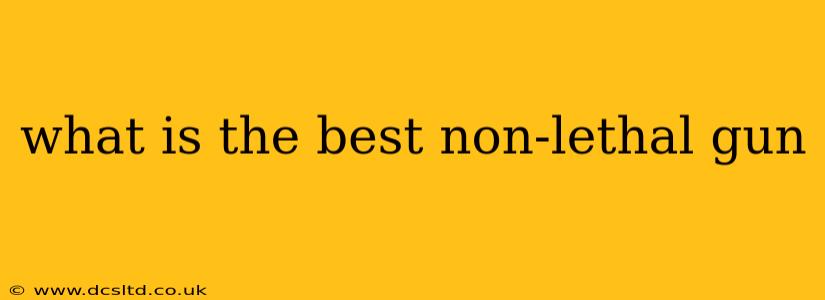What is the Best Non-Lethal Gun? A Comprehensive Guide
Choosing the "best" non-lethal gun depends heavily on individual needs and the specific situation it's intended for. There's no single perfect option, as effectiveness varies based on factors like distance, target size, and environmental conditions. This guide will explore several popular options, addressing common questions and concerns.
Understanding Non-Lethal Weapons: It's crucial to understand that while designed to incapacitate without causing death, non-lethal weapons can still cause serious injury or even death under certain circumstances. Improper use or unforeseen reactions can lead to unintended consequences. Always prioritize safety and follow all instructions and legal regulations.
Types of Non-Lethal Guns and Their Pros and Cons:
Several categories of non-lethal firearms exist, each with its own strengths and weaknesses:
1. Pepper Spray Guns:
These devices propel a concentrated stream of pepper spray over a distance, temporarily incapacitating the target with burning and irritation of the eyes, skin, and respiratory system.
- Pros: Relatively inexpensive, easy to use, and effective at close to medium range. Many are compact and easy to conceal.
- Cons: Wind can affect accuracy, and effectiveness diminishes with distance. Legal restrictions and regulations vary by location. Some individuals may be immune or less susceptible to its effects.
2. Stun Guns (Tasers):
Stun guns deliver a high-voltage, low-amperage shock that temporarily disrupts the nervous system, causing muscle incapacitation and pain. Some models are handheld, while others are firearm-like in design.
- Pros: Can be highly effective at incapacitating a threat, even at a short distance.
- Cons: Requires close proximity to the target for effective use. The range is extremely limited compared to other options. The effectiveness depends on proper contact with the target. Can still cause serious injury in some cases. Legal restrictions vary widely.
3. Air Soft Guns:
Air soft guns fire plastic projectiles propelled by compressed air or gas. While generally non-lethal, they can cause bruising or pain, particularly at close range.
- Pros: Relatively inexpensive, widely available, and can be used for training or sport shooting.
- Cons: Range and accuracy are often limited. Effectiveness at incapacitating a threat is questionable. The potential for injury exists, especially to the eyes. Legal restrictions apply.
4. Bean Bag Guns:
These guns fire fabric projectiles filled with small pellets, typically lead shot. While designed to cause blunt trauma, they can also cause serious injuries depending on the distance and impact area.
- Pros: Can be effective at incapacitating a target from a moderate range. Relatively less lethal compared to other options.
- Cons: Can cause significant bruising or injury, particularly to vulnerable areas of the body. Effectiveness can vary depending on the target and the shot's placement. Legal restrictions apply, and responsible use is critical.
What are the legal restrictions on non-lethal weapons?
H2: What are the legal restrictions on non-lethal weapons?
Legal restrictions on non-lethal weapons vary significantly by location (country, state, or even city). Laws regarding purchase, possession, and use differ, and some types may be completely prohibited in certain areas. It's essential to research and understand the specific laws in your jurisdiction before purchasing or carrying any non-lethal self-defense weapon. Failure to comply can result in serious legal consequences.
H2: What is the best non-lethal gun for self-defense?
There's no single "best" non-lethal gun for self-defense, as the ideal choice depends heavily on your individual needs and circumstances. Factors to consider include:
- Your physical capabilities: Can you effectively wield and operate the chosen weapon?
- Your level of training: Proper training and practice are essential for safe and effective use.
- The type of threat you anticipate: Different weapons are better suited for different scenarios.
- Local laws and regulations: Ensure your chosen weapon is legal in your jurisdiction.
- Your comfort level: You need to feel confident and comfortable using the weapon.
Conclusion: Thorough research, responsible use, and adherence to all local laws are crucial when considering non-lethal self-defense options. Consult with law enforcement or a self-defense expert to determine the most appropriate and safest option for your specific situation. Remember, no self-defense tool guarantees complete safety or effectiveness.
